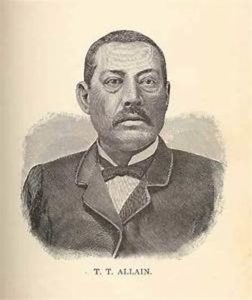
Theo Allain
On this date, we remember the birth of Theophile Allain in 1846. He was a Black farmer, merchant, and politician.
Born a slave in Baton Rouge Parish, LA, Theophile T. Allain was socially categorized as Mulatto, and treated as free by his father. He accompanied his father to Europe, traveling to the north and receiving an education from private tutors between 1856 and 1858. After the American Civil War, he attended New Brunswick, NJ school. Allain turned to his home state in 1869 and acquired the family plantation. He invested in a merchant’s business plan, which consisted of land for sugar, rice, cattle, and a grocery store.
He also formed ties with the leading commercial businessmen of the south, enjoying a substantial annual income and employing over 30 people. Allain was elected to the Louisiana House of Representatives in 1870 but denied his seat because of balloting irregularities. He was an election supervisor in 1872 and was elected and served in the Louisiana House from 1872 to 1874, the Senate from 1874 to 1880, and the House again from 1881 to 1890. Allain supported the Unification Movement, which sought to create a political alliance of Black and white moderates.
He also helped to establish Southern University as a state-supported Black institution, differing from some Black leaders who opposed it as a concession to racial segregation. He moved to Chicago before the turn of the century. Eventually, he ended up in Washington, D.C., wherein in 1899, he was on the national executive committee of the Afro-American League. He had six children, all of whom attended Straight University. Theophile Allain died in Louisiana in 1917.